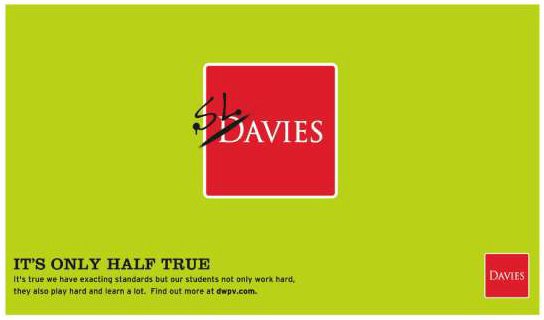Law students are outraged over a tongue-in-cheek advertisement that law firm Davies Ward Phillips & Vineberg LLP recently ran in Osgoode Hall Law School’s student-run newspaper
Obiter Dicta.

In a law firm’s rare effort to poke fun at itself, Davies — also referred to by aspiring lawyers as “Slavies” for overloading its students and associates with work — exploited its nickname in an ad.
But some students did not find it very funny.
Osgoode students Kisha Munroe and Samara Secter submitted
letters to the editor of
Obiter Dicta expressing their disapproval.
“I take a real exception to the fact that there are people for whom this joke would even be funny and that this offensive retooling of a name gained enough momentum to take hold in the sub-culture of law students. This is beyond my control and not something that is likely to change until attitudes regarding offensive speech and awareness of its impact change,” Munroe wrote.
“That Davies saw fit to run an ad invoking the shameful, genocidal, dehumanizing practice of forced, unpaid, lifelong labour and suffering that was essential to the power the Western world now enjoys is despicable.”
Other students, including Osgoode student Andrew Emery who also wrote a
letter to the editor, found no offence at all.
“There is nothing offensive about playing on the perception that Davies students work like slaves. It is as offensive as just saying the word ‘slave.’ Just saying a word doesn’t make it offensive,” Emery wrote.
Apologies from Davies’ director of student affairs Frances Mahil ensued after the students' negative reaction. The firm's note in
Obiter Dicta stated:
“It has come to our attention that the advertisement we recently placed in the Obiter Dicta made some students and faculty believe that we were making light of the very serious subject of slavery.
The intent of the advertisement was instead to try to suggest that the nickname students have used for our firm for many, many years should not dissuade students from considering applying to us for summer or articling positions. We were aiming for some self-deprecating humour. It did not occur to our team that we would be seen as making light of slavery, rather than simply poking fun at ourselves. Obviously it should have.
We thank those who brought this to our attention and accept their criticism. We sincerely apologize to those who were offended. We will not run the advertisement again.”
Davies declined Legal Feeds’ request for comments.
But Joy Wakefield, a third-year student at the Queen’s University Faculty of Law, says an apology is not sufficient.
“It’s one thing to apologize and say, ‘OK, we won’t run the ad again.’ It’s another thing to say, ‘We’re taking steps to make sure that this doesn’t happen again; we’re taking steps to make sure that we’re addressing attitudes that allowed this to happen in the first place,’” she tells Legal Feeds.
“I would like to see an assurance that they’re taking students’ concerns regarding workload (A) and (B) the diversity and cultural sensitivity issues seriously, to the point that they’re actually going to do something about it,” she adds. “Because an apology letter is lip service but let’s see what’s actually going to change.”
Wakefield says it boils down to a lack of diversity at some law firms and it’s time for law schools and law firms to start thinking about training students and lawyers on cultural sensitivity.
The story has got legs, drawing comment from various blawgs in Canada (Law is Cool: “
These days the slaves fight back”) and the United States (Above the Law: “
Truth in advertising”).
ATL’s Elie Mystal thought students overreacted a tad to the ad: “Jesus! Slavery was bad, I get it. But the Davies ad isn’t saying it views new recruits literally as slaves. I’m pretty sure that would be illegal! Can’t we all at least agree that that the Davies ad was just a simile? An analogy? A figure of freaking speech?”

 In a law firm’s rare effort to poke fun at itself, Davies — also referred to by aspiring lawyers as “Slavies” for overloading its students and associates with work — exploited its nickname in an ad.
In a law firm’s rare effort to poke fun at itself, Davies — also referred to by aspiring lawyers as “Slavies” for overloading its students and associates with work — exploited its nickname in an ad.